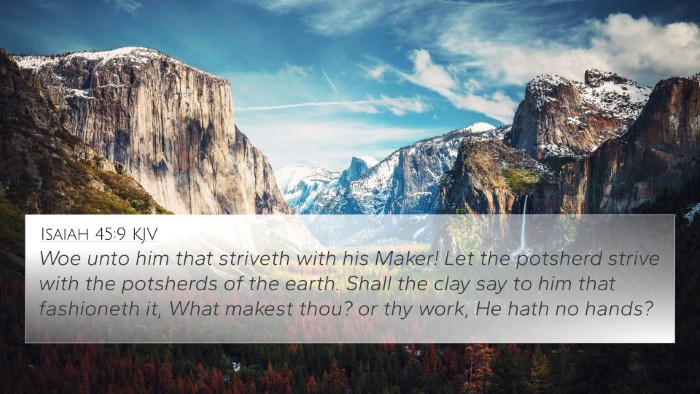Understanding Jeremiah 18:4
Jeremiah 18:4 states: "And the vessel that he made of clay was marred in the hand of the potter: so he made it again another vessel, as seemed good to the potter to make it." This verse is rich with theological significance and reveals key insights about God's nature and human beings' relationship with Him.
Summary of Meaning
This scripture depicts a metaphorical relationship between God, represented as the potter, and humanity, represented as clay. The act of the potter reshaping the marred vessel symbolizes God's sovereignty and His ability to reshape lives according to His divine will. This theme of God's creative power and grace is echoed throughout the Bible.
Biblical Connections
Jeremiah 18:4 serves as a focal point illustrating the interactions and connections between various Biblical texts. Below, we explore key connections and themes:
- Isaiah 64:8: "But now, O Lord, thou art our father; we are the clay, and thou our potter; and we all are the work of thy hand." This verse directly parallels Jeremiah 18:4, reinforcing the idea of God as the creator and humanity as His creation.
- Romans 9:20-21: This passage discusses the relationship between the creator and the creation and emphasizes God's right to shape us as He wills, much like a potter with clay.
- 2 Timothy 2:20-21: Illustrates vessels of honor versus vessels of dishonor, highlighting God's purpose for each individual, similar to how the potter decides the form of the vessel.
- Job 10:8-9: Job acknowledges God as his creator and expresses the vulnerability and dependence of humanity upon God's design and purpose.
- Psalm 100:3: "Know ye that the Lord he is God: it is he that hath made us, and not we ourselves; we are his people, and the sheep of his pasture." This emphasizes divine authorship and guidance.
- Ephesians 2:10: "For we are his workmanship, created in Christ Jesus unto good works, which God hath before ordained that we should walk in them." This scripture beautifully connects to the theme of being shaped by God for a purpose.
- Philippians 1:6: "Being confident of this very thing, that he which hath begun a good work in you will perform it until the day of Jesus Christ." This speaks to God's ongoing work in our lives, akin to the potter's shaping process.
Commentary Insights
Insights from public domain commentaries enhance our understanding of this verse:
- Matthew Henry: Emphasizes God’s providence and the need for submission to His will as He molds us into what He desires, just as the potter has control over the clay.
- Albert Barnes: Notes the importance of the potter's discretion in shaping the clay, drawing a parallel to God's sovereignty and the importance of our humble response to His crafting hands.
- Adam Clarke: Highlights the concept of restoration, focusing on the hope that even when marred, God can remake us into vessels of honor.
Thematic Explorations
Several themes can be explored further through cross-referencing:
- Divine Sovereignty: Explored in passages like Romans 9 and Isaiah 45:9-10, reflecting on God's ultimate authority over creation.
- Human Fragility: The marred clay signifies our fallen nature, inviting reflection on Romans 3:23 ("For all have sinned...").
- Hope and Renewal: Highlighted through verses like 2 Corinthians 5:17, emphasizing new life in Christ as a new creation.
Application of Cross-Referencing
Utilizing tools for Bible cross-referencing can deepen understanding and enhance Bible study. Some methods include:
- Using a Bible concordance to trace themes.
- Creating a cross-reference Bible study guide for personal or group studies.
- Engaging in comparative Bible verse analysis to draw connections between Old and New Testament teachings.
- Exploring thematic Bible verse connections, such as God's nature across different scriptures.
- Employing inter-Biblical dialogue to foster deeper relationships between texts and themes.
Conclusion
Jeremiah 18:4 serves as a profound reminder of both divine sovereignty and human vulnerability. Engaging with this verse through scriptural cross-referencing enriches our understanding of God's redemptive work in our lives. By reflecting upon the various dimensions of this verse, believers can find hope, encouragement, and clarity in their spiritual journeys.





